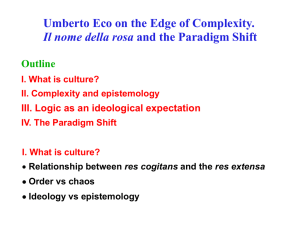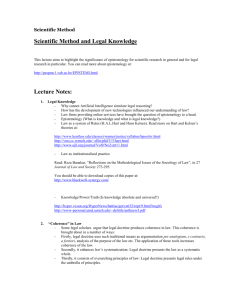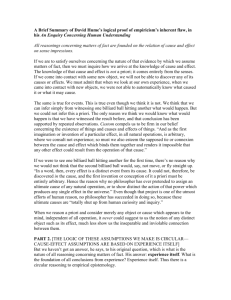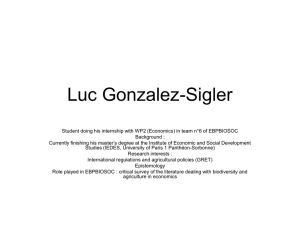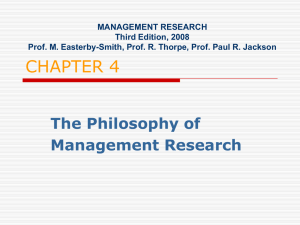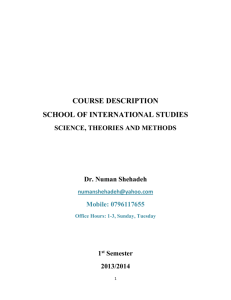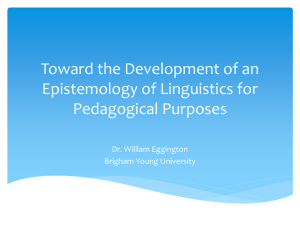An analysis of the trajectory of epistemology in education shows that
advertisement
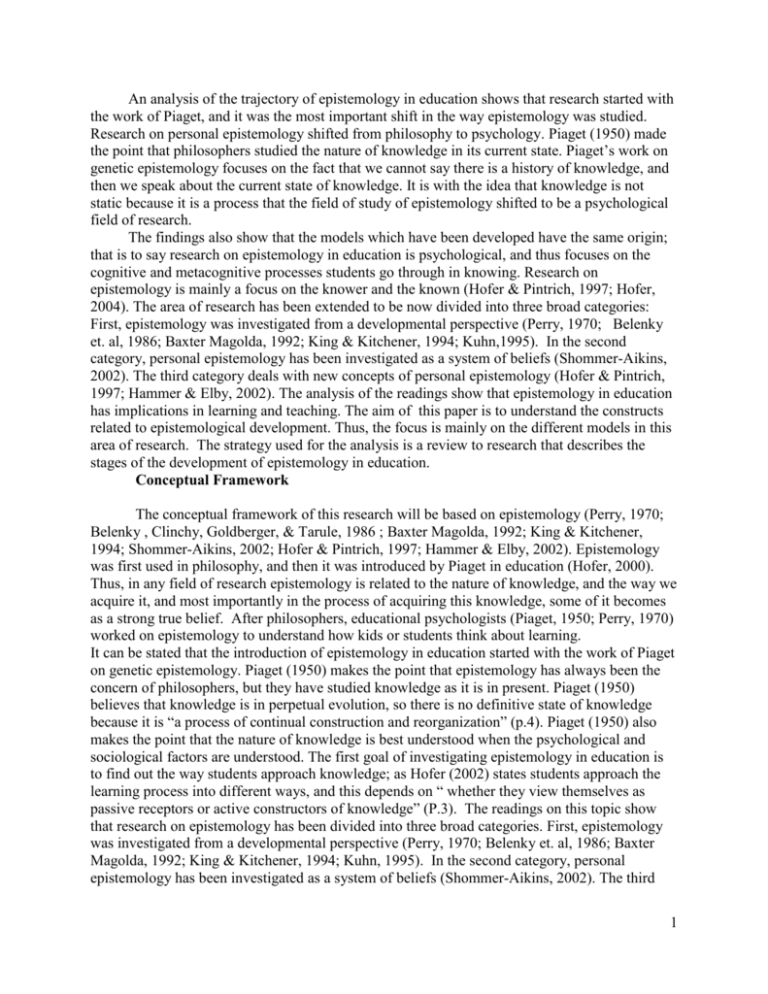
An analysis of the trajectory of epistemology in education shows that research started with the work of Piaget, and it was the most important shift in the way epistemology was studied. Research on personal epistemology shifted from philosophy to psychology. Piaget (1950) made the point that philosophers studied the nature of knowledge in its current state. Piaget’s work on genetic epistemology focuses on the fact that we cannot say there is a history of knowledge, and then we speak about the current state of knowledge. It is with the idea that knowledge is not static because it is a process that the field of study of epistemology shifted to be a psychological field of research. The findings also show that the models which have been developed have the same origin; that is to say research on epistemology in education is psychological, and thus focuses on the cognitive and metacognitive processes students go through in knowing. Research on epistemology is mainly a focus on the knower and the known (Hofer & Pintrich, 1997; Hofer, 2004). The area of research has been extended to be now divided into three broad categories: First, epistemology was investigated from a developmental perspective (Perry, 1970; Belenky et. al, 1986; Baxter Magolda, 1992; King & Kitchener, 1994; Kuhn,1995). In the second category, personal epistemology has been investigated as a system of beliefs (Shommer-Aikins, 2002). The third category deals with new concepts of personal epistemology (Hofer & Pintrich, 1997; Hammer & Elby, 2002). The analysis of the readings show that epistemology in education has implications in learning and teaching. The aim of this paper is to understand the constructs related to epistemological development. Thus, the focus is mainly on the different models in this area of research. The strategy used for the analysis is a review to research that describes the stages of the development of epistemology in education. Conceptual Framework The conceptual framework of this research will be based on epistemology (Perry, 1970; Belenky , Clinchy, Goldberger, & Tarule, 1986 ; Baxter Magolda, 1992; King & Kitchener, 1994; Shommer-Aikins, 2002; Hofer & Pintrich, 1997; Hammer & Elby, 2002). Epistemology was first used in philosophy, and then it was introduced by Piaget in education (Hofer, 2000). Thus, in any field of research epistemology is related to the nature of knowledge, and the way we acquire it, and most importantly in the process of acquiring this knowledge, some of it becomes as a strong true belief. After philosophers, educational psychologists (Piaget, 1950; Perry, 1970) worked on epistemology to understand how kids or students think about learning. It can be stated that the introduction of epistemology in education started with the work of Piaget on genetic epistemology. Piaget (1950) makes the point that epistemology has always been the concern of philosophers, but they have studied knowledge as it is in present. Piaget (1950) believes that knowledge is in perpetual evolution, so there is no definitive state of knowledge because it is “a process of continual construction and reorganization” (p.4). Piaget (1950) also makes the point that the nature of knowledge is best understood when the psychological and sociological factors are understood. The first goal of investigating epistemology in education is to find out the way students approach knowledge; as Hofer (2002) states students approach the learning process into different ways, and this depends on “ whether they view themselves as passive receptors or active constructors of knowledge” (P.3). The readings on this topic show that research on epistemology has been divided into three broad categories. First, epistemology was investigated from a developmental perspective (Perry, 1970; Belenky et. al, 1986; Baxter Magolda, 1992; King & Kitchener, 1994; Kuhn, 1995). In the second category, personal epistemology has been investigated as a system of beliefs (Shommer-Aikins, 2002). The third 1 category deals with alternative concepts of personal epistemology (Hofer & Pintrich, 1997; Hammer & Elby, 2002). The aim of reviewing the three categories is to have a deep understanding of the construct of personal epistemology, how it has been investigated, how the models overlap. In addition to this, I want to understand the gap of research in this area, and to be able to select the model that I will use as the theoretical framework in writing my thesis. Implications for Learning and Teaching The implications of personal epistemology in learning and teaching have been mainly established by Perry (1970). Learning is now considered as developmental, which means it is a cognitive process. According to Perry (1970), the understanding of students’ personal epistemology promotes building a diverse school community. In instruction, Perry’s scheme can be used by the teacher to understand how “he can be so differently perceived by various students in his class” (P.201). In this way, the scheme is a solace to the teacher that “can free his thinking for a more differentiated address to individual students “where they are”” (P.210). Research on epistemic beliefs has started with a focus on students’ beliefs, and the learning implications have been confirmed (Brownlee, Schraw, and Berthelsen, 2011). They claim that by understanding the way students view knowledge, teachers will help students become active agents in their own learning. Research has also focused on personal epistemologies that are activated during the learning process, but little research has focused on teachers’ epistemic beliefs during the process of teaching (Hofer, 2004; Fives & Buehl, 2008; Bendixen & Feuch, 2010 ). Drawing from the literature on teachers’ epistemic beliefs, it can be stated that teachers hold beliefs that guide and influence their actions (Fives & Buehl, 2008). In fact, these beliefs can be either explicit or implicit. Implicit beliefs contribute the development of tacit knowledge, and teachers will not be aware of, and thus is rarely activated or evaluated (Bendixen & Feuch, 2010). When dealing with teachers’ personal epistemology, research focuses on the way teachers define, construct, justify, and construct knowledge (Hofer, 2002). 2 References Alkin, MC. (1992). Encyclopedia of educational research. Macmillan Publishing Company. Baxter Magolda, M.B. (1992). knowing and reasoning in college: Gender-related patterns in students' intellectual development. San Fransisco: Jossey-Bass. Belenky, M., Clinchy, B., Goldberger, N., & Tarule, J. (1986). Women's ways of knowing: the development of self, voice and mind . New York: Basic books. Bendixen, L. D., & Feucht, F. C. (2010). Personal epistemology in the classroom: theory, research and implication for practice. Cambridge University Press. Brownlee, J., Schraw, G., & Berthelesen, D. (2011). Personal epistemology and teacher education. Routledge. Chai, C. S. (2010). Teachers' epistemic beliefs and their pedagogical beliefs: a qualitative case study among Singaporean teachers in the context of ICT supported reforms. Tojet: the Turkish Online Journal of Educational Technology, 9(4), 129-140.XXXepistemological understanding as a metacognitive process: think-aloud during online searching. (2004). Educational Psychologist, 39(1), 43-55. Fives, H., & Buehl, M. (2010). In L. D. Bendixen & F. C. Feucht (Eds.), Personal epistemology in the classroom: Theory, research, and implication for practice Cambridge University Press. Hammer, D., & elby, A. (2002). On the form of a personal epistemology. In Hofer. B.K & Pintrich. P.R (Eds.), Personal epistemology: The psychology of beliefs about knowledge and knowing (pp. 169-190). Mahwah: Lawrence Erlbaum Associates, Publishers. Head, K., & Taylor, P. (1997). Reading in teacher development. London: Heinemann English Language Teaching. Hofer, B. K. (2001). Dimensionality and disciplinary differences in personal apistemology. Contemporary Educational Psychology, 13(4), 353-383. Hofer, B. K. (2004). epistemological understanding as a metacognitive process: think-aloud during online searching. Educational Psychologist, 39(1), 43-55. Hofer, B. K., & Pintrich, P. R. (1997). the development of epistemological theories: Beliefs about knowledge and knowing and their relation to learning. Review of Educational Research, 67(1), 88-140. King, P. M., & Kitchener, K. S. (1994). Developing reflective judgement. San Fransisco: JosseyBass. Knowledge and teaching: Foundations of the new reform. (1987). Harvard Educational Review, 57, 1-22. Kuhn, D. (1991). The skills of argument. England: Cambridge University Press. Moore, W. S. (2002). Understanding learning in a postmodern world: Reconsidering the Perry scheme of intellectual and ethical development. In Hofer. B.K & Pintrich. P.R (Eds.), Personal epistemology: The psychology of beliefs about knowledge and knowing (pp. 169-190). Mahwah: Lawrence Erlbaum Associates, Publishers. Pajares, M. F. (1992). Teachers' beliefs and educational research: cleaning up a messy construct. Review of Educational Research, 62(3), 307-332. Perry, W. G. (1970). Forms of intellectual and ethical development in the college years: A scheme. New York: Holt, Rinehart and Winston. Piaget, J. (1970). The principles of genetic epistemology (Eleanor Duckworth, Trans.). New York: Columbia University Press. 3 Shommer-Aikins, M. (1990). Effects of beliefs about the nature of knowledge on comprehension. Journal of Educational Psychology, 82(3), 498-504. Shulman, L. S. (1987). Knowledge and teaching: Foundations of the new reform. Harvard Educational Research, 57(2), 1-22. Wong, A., K., Chan., K, W., & Lai, P-Y. (2009). Revisiting the relationships of epistemic beliefs and conceptions about teaching and learning of pre-service teachers in Hong Kong. The Asia-Pacific Educational Researcher, 18(1), 1-19. 4
